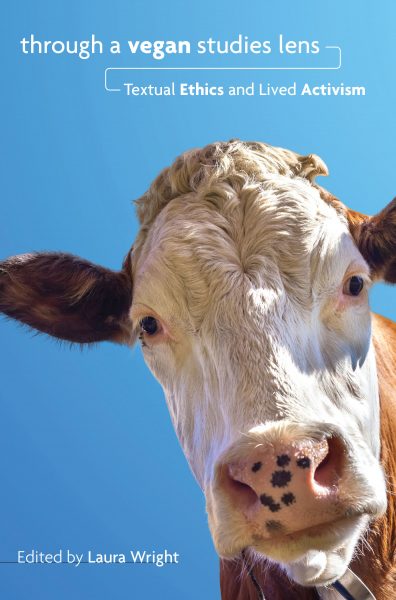Through a Vegan Studies Lens: Textual Ethics and Lived Activism, edited by Laura Wright, is part of the series “Cultural Ecologies of Food in the 21st Century” from the University of Nevada Press, bringing attention to the ways in which our food choices “produce ecologies of effects, environmentally and otherwise.”
I am thrilled to see this book out in the world—and not only because it contains a literature-themed essay by Ashland Creek Press and EcoLit Books co-founder John Yunker, or because it also contains a provocative essay by 2019 Siskiyou Prize Judge Carol J. Adams, or because there’s a vital, eye-opening essay by Writing for Animals contributor Alex Lockwood (I think this covers all my disclosures). I’m thrilled to see this book because it’s a necessary text, not only for those in the fields of vegan, animal, and environmental studies but for all who care about animals and the planet. This book challenges conventional cultural norms and inspires us to change old ways of thinking and to do better.
Through a Vegan Studies Lens is academic in nature (and comes with a hefty price tag), yet I hope this doesn’t deter mainstream readers, in particular those who care about animals and the environment but also those have who have yet to see that being an animal lover or an environmentalist means being vegan. As Wright outlines in her introduction, this book aims to encourage us all to take a truly intersectional approach to both life and scholarship: “[A] vegan reading requires that we see the enmeshed oppressions—of the land, the animals, and the people—as necessarily inherently linked and mutually reinforcing.”
Environmental and animal advocates will find it heartening to read that a 2006 study estimated there are 1.7 million vegans in the United States (and this number only seems to be growing), and that since that year, the number of vegans in the UK has expanded by 360 percent. However, as Wright notes, “There are many reasons why people choose to become vegan, and there are reasons why others choose not to be—and there are certainly socioeconomic and structural hindrances that keep veganism from being a viable option for many others, a reality upheld by racist and classist food systems, particularly as food is commodified and distributed in places like the US … That the ability to eat well and to be vegan remains unattainable to so many people is indicative of systemic food insecurity resulting from income inequality and underlying structural racism.” This book, as a whole, challenges us to see the big picture, which shows just how far we have to go—and yet, while the road ahead is long and some of the realities stark, these individual essays also offer plenty of wisdom, inspiration, and hope.
Through a Vegan Studies Lensis divided into four sections: Vegan Studies, Expanding Ecocriticism(s); Vegan Studies in the United States; Vegan Studies Beyond the West; and Hypocrites and Hipsters: Meat and Meatlessness—and, as Wright notes in her introduction, these essays are “engaged with texts and spaces—historical, social, and global—well beyond its previous boundaries, and they are very much engaged with doing theory differently.”
Examining literature and politics through a vegan lens is thought-provoking and essential for vegans and omnivores alike, and the essays in this book highlight the ways in which society finds excuses, personal and universal, for abusing and killing animals. It’s insightful and necessary to see popular books—including Michael Pollan’s The Omnivore’s Dilemmaand Barbara Kingsolver’s Animal, Vegetable, Miracle—called out for representing vegans as “naïve, uninformed, and out of step with human evolution,” as Kathryn Kirkpatrick points out in her important essay “Vegans in Locavore Literature,” which highlights the flaws in writing that “inscribes meat-eating as essential to being human” and in which “[t]he killing of another animal therefore becomes a significant rite of passage.” As Kirkpatrick also notes, “By understanding better the ways vegans are represented in locavore texts, we might disentangle the affirmational support for local organic farmers from the pastoral nostalgia that obscures the sexism, racism, and speciesism of locavorism’s agrarian roots.”
Among the worthy and thought-provoking topics in this book are an examination of the effects of our culture’s representations of animal suffering, including in books, films, social media, and politics. Carol J. Adams outlines the ways in which “President Trump is the avatar of the sexual politics of meat,” in her essay “The Sexual Politics of Meat in the Trump Era.” In her groundbreaking book The Sexual Politics of Meat, Adams shows the connection between violence against women and animals used for meat, via objectification, fragmentation, and consumption — and in this essay, she calls out Trump’s rhetoric for the normalizing and mainstreaming of these tendencies— “[The] sexual politics of meat attitudes are often expressed by Donald Trump, conveying a worldview that women are available as objects for his use, like the other animals … Trump refers to women as objects … Trump fragments women into body parts … Trump talks about his right to consume women”—and there is no shortage of examples, of all of this and more, in taped comments by the president. Adams offers stunning examples of misogyny in animal agriculture, meat consumption and advertising, and the Trump campaign, and her suggestion for how best to respond to all of this—by being vegan—is not only specific to how to survive the Trump administration, but it also underscores other reasons veganism makes sense: “The nature of veganism in itself resists some of the harms of the Trump era … veganism is much less environmentally demanding than meat and dairy consumption, thus reducing the harms associated with climate change. The daily action of veganism withdraws support for products that arise from deeply patriarchal attitudes. In addition, a healthy vegan diet offers protection against stress during times of political turmoil.”
Most of the essays focus on viewing literature through a vegan lens. Ryan Phillips’s essay “A Vegan Rhetorical Approach to Upton Sinclair’s The Jungle” points out that Sinclair’s novel, through which Sinclair had hoped to draw attention to labor issues, resulted in change of another kind: food safety. “Although much public and academic discourse has focused on the intended goals and materialized outcomes of The Jungle, there remains a dearth of analysis focusing on the vegan implications of Sinclair’s novel.” And while Sinclair was himself a vegetarian, he “never explicitly expressed any intentions to curb the meat-eating behavior of his readers and the general public” and “the public did not misinterpret The Jungle as a call towards vegetarianism or animal welfare policy reforms.” Phillips goes on to explore why the animal-rights issues—and obvious outcomes, such as vegetarianism and veganism—did not take hold when The Jungle was published, despite the novel’s detailed focus on animal cruelty, and why this novel isn’t remembered as a work of animal-rights advocacy, providing a fascinating look at U.S. social (and vegetarian) history along the way.
The section titled “Vegan Studies Beyond the West” includes essays exploring vegan studies beyond the U.S. and the U.K. and into South Africa, Estonia, and South Korea, examining the intersection of such issues as globalization, postcolonialism, classism, and veganism. This is an engrossing and essential section of the book; as contributor Kadri Aavik notes, “Veganism as an emerging social and cultural phenomenon is likely to be empirically and conceptually different in other social, cultural, and political settings”—and these essays offer invaluable insights for the Western reader.
The essays in the final section of the book, “Hypocrites and Hipsters; Meat and Meatlessness,” are particularly valuable in their examination of such topics as the rhetoric of hipster omnivores in defending their consumption of animals; the resistance of environmentally minded college students to changing their diets, despite this being a major way to improve the environment; and the hypocrisy of much so-called nature writing (which often conveniently neglects the rights of non-human animals). In his essay “H Is for Hypocrite: Reading ‘New Nature Writing’ Through the Lens of Vegan Theory,” Alex Lockwood quotes Dinesh Wadiwel’s The War Against Animals, in which Wadiwel notes that we humans create violence rather than kindness because we “miss the nature of institutional violence, which is hidden not because it isn’t in sight, but because our knowledge systems do not allow us to see this as violence.” It is from here that Lockwood argues that it is through vegan studies that we can begin to see this reality—this violence—for what it is and reject it. Lockwood highlights several texts — Charles Taylor’s Being a Beast, George Monbiot’s Feral, and Kathleen Dean Moore’s Great Tide Rising, and in particular Helen Macdonald’s H Is for Hawk (which he aptly calls “the diary of a blood sport”)—noting specific instances of speciesism and how “the failures of much new nature writing to take all nonhuman life into account asks us to question why these writers ignore deeper questions of animal otherness, and the resultant inequalities and environmental impacts such ignorance brings forth.”
Through a Vegan Studies Lensis an essential academic text in the fields of animal and environmental studies, and particularly in animal and environmental literature. Yet it’s also a worthwhile and important book for anyone concerned about animal welfare and the environment, with essays that challenge how we currently think and read, in necessary and forward-thinking ways.

Midge Raymond is a co-founder of Ashland Creek Press. She is the author of the novels Floreana and My Last Continent, the award-winning short story collection Forgetting English, and, with John Yunker, the suspense novel Devils Island.


